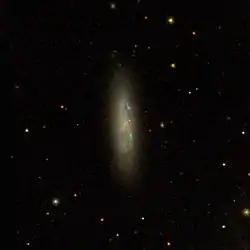NGC 485
NGC 485, also commonly referred to as PGC 4921 or GC 270, is a spiral galaxy in the constellation Pisces.[4] It is located approximately 86 million light-years from Earth[3] and was discovered on January 8, 1828 by astronomer William Herschel.[5] It was later also observed by Heinrich d'Arrest and Herman Schultz. When NGC 485 was originally categorized in the New General Catalogue by John Louis Eil Dreyer in 1888, it was incorrectly described as a "considerably faint, pretty large, round, 8th magnitude star 3 1/2 arcmin to southwest".[6]
| NGC 485 | |
|---|---|
 SDSS view of NGC 485 | |
| Observation data (J2000 epoch) | |
| Constellation | Pisces |
| Right ascension | 01h 21m 27.594s[1] |
| Declination | +07° 01′ 05.01″[1] |
| Redshift | 0.007495 ± 0.000007[2] |
| Helio radial velocity | (2239 ± 2) km/s[2] |
| Distance | 86 Mly[3] |
| Apparent magnitude (V) | 13.2 |
| Characteristics | |
| Type | Sa[2] |
| Apparent size (V) | 1.7′ × 0.6′ |
| Other designations | |
| UGC 895, MCG+01-04-032, PGC 4921[2] | |
References
- Skrutskie, M.; et al. (2006). "The Two Micron All Sky Survey (2MASS)". The Astronomical Journal. 131 (2): 1163–1183. Bibcode:2006AJ....131.1163S. doi:10.1086/498708.
- "NGC 485". SIMBAD. Centre de données astronomiques de Strasbourg. Retrieved 2021-01-30.
- An object's distance from Earth can be determined using Hubble's law: v=Ho is Hubble's constant (70±5 (km/s)/Mpc). The relative uncertainty Δd/d divided by the distance is equal to the sum of the relative uncertainties of the velocity and v=Ho
- "Revised NGC Data for NGC 485". spider.seds.org. Retrieved 2017-10-05.
- "Your NED Search Results". ned.ipac.caltech.edu. Retrieved 2017-10-05.
- "New General Catalog Objects: NGC 450 - 499". cseligman.com. Retrieved 2017-10-13.
External links
 Media related to NGC 485 at Wikimedia Commons
Media related to NGC 485 at Wikimedia Commons- NGC 485 on WikiSky: DSS2, SDSS, GALEX, IRAS, Hydrogen α, X-Ray, Astrophoto, Sky Map, Articles and images
- SEDS
This article is issued from Wikipedia. The text is licensed under Creative Commons - Attribution - Sharealike. Additional terms may apply for the media files.